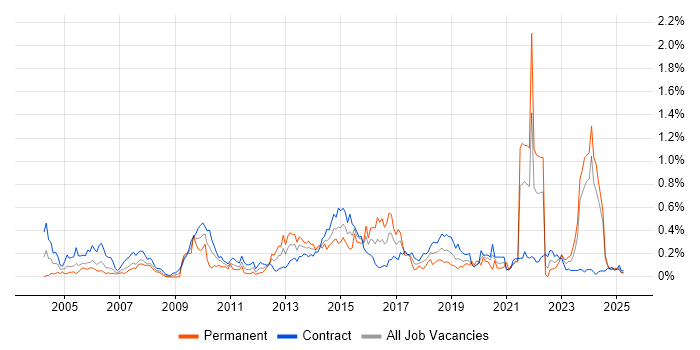Reference Data
UK > Scotland
The table below looks at the prevalence of the term Reference Data in permanent job vacancies in Scotland. Included is a benchmarking guide to the salaries offered in vacancies that cited Reference Data over the 6 months leading up to 1 May 2025, comparing them to the same period in the previous two years.
| 6 months to 1 May 2025 |
Same period 2024 | Same period 2023 | |
|---|---|---|---|
| Rank | 142 | 150 | 212 |
| Rank change year-on-year | +8 | +62 | -61 |
| Permanent jobs citing Reference Data | 3 | 138 | 10 |
| As % of all permanent jobs advertised in Scotland | 0.11% | 2.05% | 0.21% |
| As % of the Miscellaneous category | 0.43% | 4.24% | 0.51% |
| Number of salaries quoted | 0 | 1 | 2 |
| 10th Percentile | - | - | £43,500 |
| 25th Percentile | - | £56,250 | £45,000 |
| Median annual salary (50th Percentile) | - | £62,500 | £50,000 |
| Median % change year-on-year | - | +25.00% | - |
| 75th Percentile | - | £68,750 | £55,000 |
| 90th Percentile | - | - | £56,500 |
| UK median annual salary | £75,000 | £86,000 | £70,000 |
| % change year-on-year | -12.79% | +22.86% | -17.65% |
All Generic Skills
Scotland
Reference Data falls under the General and Transferable Skills category. For comparison with the information above, the following table provides summary statistics for all permanent job vacancies requiring generic IT skills in Scotland.
| Permanent vacancies with a requirement for generic IT skills | 701 | 3,257 | 1,945 |
| As % of all permanent jobs advertised in Scotland | 24.88% | 48.35% | 41.17% |
| Number of salaries quoted | 424 | 853 | 805 |
| 10th Percentile | £36,625 | £30,150 | £32,492 |
| 25th Percentile | £46,250 | £40,000 | £42,000 |
| Median annual salary (50th Percentile) | £51,645 | £55,000 | £58,000 |
| Median % change year-on-year | -6.10% | -5.17% | +5.45% |
| 75th Percentile | £68,750 | £72,433 | £75,000 |
| 90th Percentile | £91,519 | £82,548 | £89,852 |
| UK median annual salary | £60,000 | £55,000 | £65,000 |
| % change year-on-year | +9.09% | -15.38% | +4.00% |
Reference Data
Job Vacancy Trend in Scotland
Job postings citing Reference Data as a proportion of all IT jobs advertised in Scotland.

Reference Data
Salary Trend in Scotland
3-month moving average salary quoted in jobs citing Reference Data in Scotland.
Reference Data
Job Locations in Scotland
The table below looks at the demand and provides a guide to the median salaries quoted in IT jobs citing Reference Data within the Scotland region over the 6 months to 1 May 2025. The 'Rank Change' column provides an indication of the change in demand within each location based on the same 6 month period last year.
| Location | Rank Change on Same Period Last Year |
Matching Permanent IT Job Ads |
Median Salary Past 6 Months |
Median Salary % Change on Same Period Last Year |
Live Jobs |
|---|---|---|---|---|---|
| Edinburgh | - | 2 | - | - | |
| Glasgow | +66 | 1 | - | - | 3 |
| Reference Data UK |
|||||
Reference Data
Co-occurring Skills and Capabilities in Scotland by Category
The follow tables expand on the table above by listing co-occurrences grouped by category. The same employment type, locality and period is covered with up to 20 co-occurrences shown in each of the following categories:
